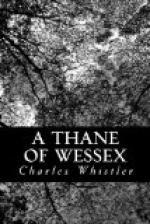When we came to the steep rise of Cannington hill, some of those thanes spurred on and rode to the summit, and there waited a little, till the men joined them. There was silence, and a closing up as they breasted the steep pitch; and then I must go through woods, and so lost sight of them for a while. I passed close to my own hall—closed and deserted. Every soul in all the countryside had fled into the town, though after the levy came a great mixed crowd of thralls and the like to see the fray.
Now here I thought to cross in the rear of the force that I might reach Combwich hill. But that was not to be.
When I saw the array again it was halted, and the men were closing up. And between the levy and that crowd of followers was a great gap, and some of these last were making for the shelter of swamp and wood. I myself was on a little rise of heathy land and could see plainly before me the road going up over the neck of Combwich hill in the steep-sided notch there is there, where the ascent is easiest.
And that road was barred halfway up the hillside by a close-ranked company, on which the sun shone brightly, showing scarlet cloaks and gilded helms not only on the roadway, but flanking the hills on either side. These were the Danes, and behind them, over the hill, rose the smoke from Matelgar’s burnt home.
Even as I looked, a great roar of defiance came from our men; but the Danes made no answer, standing still and silent. And that seemed terrible to me. So for a moment they stood, and then, as at some signal, from them broke out that deep chant with its terrible swinging melody, that had come faintly to me from Watchet haven.
Then our men rushed forward, and even where I stood I could hear the crash of arms on shields as the lines met—the ringing of the chime of war—and our men fought uphill.
And now it needed all my force to keep myself, for Alswythe’s sake, from joining in that fray, and presently, when I would take my hand from my sword hilt, it was stiff and cramped from clutching hard upon it, as I watched those two lines swaying, and heard the yells of the fighters.
And indeed I should surely have joined, but there came a voice to me:
“Bide here in patience, Heregar, the king’s thane! There is work for you yet that fighting will hinder.”
And the old crone, Gundred, who had come I know not how, laid her hand on my arm.
“Look at the tide, Heregar, look at the tide!” she said, pointing to Parret river, where the mud banks lay bare and glistening with the falling water. “Let them drive these Danes back to their stranded ships, and how many will go home again to Denmark, think you?”
And I prayed that this might be so: for I knew she spoke truth. If they might not reach their ships, and became penned in on Stert, they were lost—every one, for none might cross the deep ooze.
“Not this time, Heregar. Remember, when the time comes,” she said.




